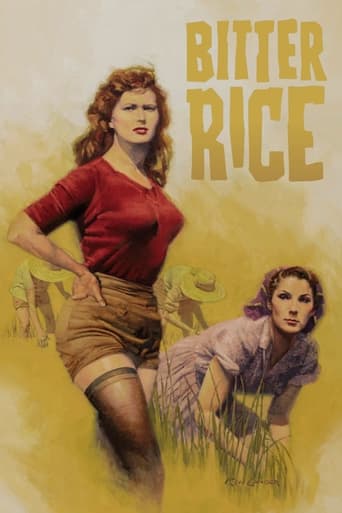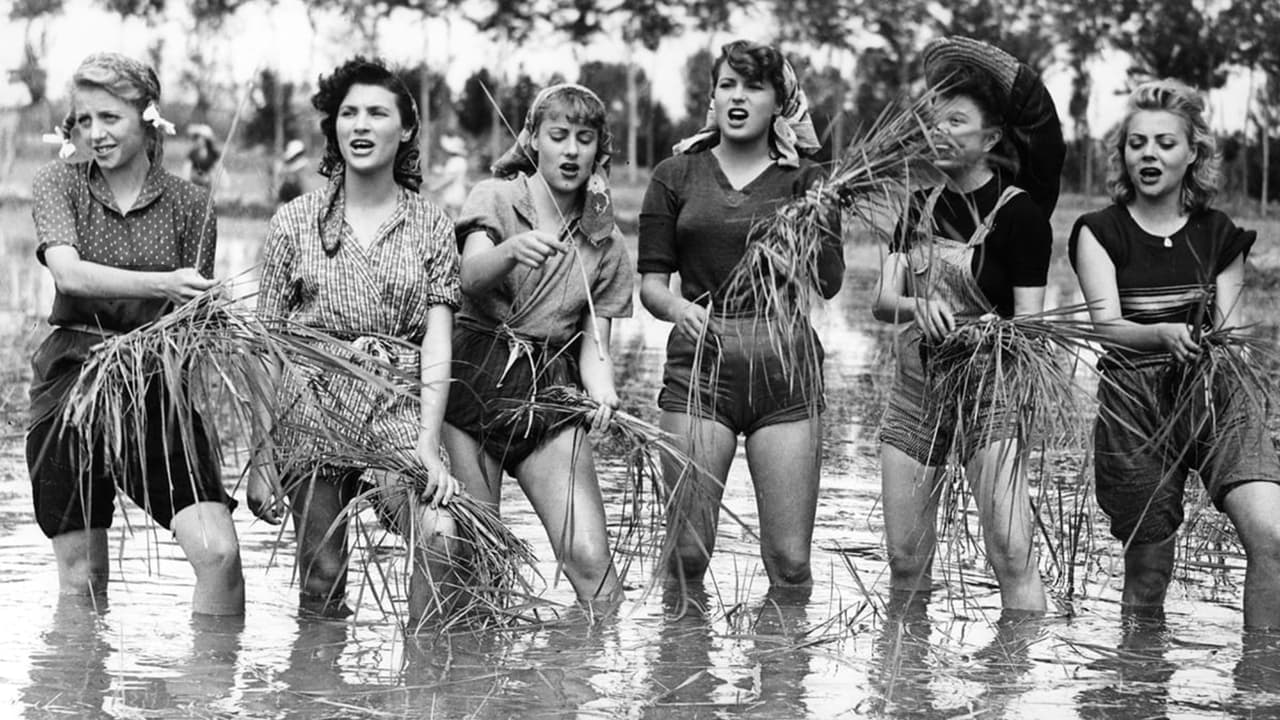gavin6942
Francesca and Walter are two-bit criminals in Northern Italy, and, in an effort to avoid the police, Francesca joins a group of women rice workers. She meets the voluptuous peasant rice worker, Silvana, and the soon-to-be-discharged soldier, Marco. Walter follows her to the rice fields, and the four characters become involved in a complex plot involving robbery, love, and murder.In the film, the character Silvana represents enchantment with behavior modeled in American films, such as chewing gum and boogie-woogie dancing. Her downfall shows director Giuseppe De Santis's condemnation of these products of American capitalism. In addition, Silvana was considered by many audiences to be overly-sexualized. This sexualization and the melodramatic presence of death and suicide in the film cause it to diverge from typical Italian neorealism.I do find the symbolism interesting, especially because (as noted) the neorealist films of the era (which have been getting a major re-evaluation as of late) really are pretty straight-forward, very Italian, and often dealing with post-war themes. There is some of that post-war feeling here, but we see less of the "city as a character" and more individuals.On a personal note, I like that this film is an early entry in the DeLaurentiis dynasty. Dino DeLaurentiis produced, and his wife is the star. This is 1949 (just after World War II), and the family is still an important part of Italian and American culture today (2016).
popcorninhell
There's something about the way actress Doris Dowling stares piercingly into the eyes of the men and women who temporarily populate the Po Valley of northern Italy. Hardly a shrinking violet, the shrewdness she innately possesses drips from her sweated brow and subtle scowl. She's equal parts Barbara Stanwyck in Double Indeminity (1944) and Vivien Leigh in Streetcar (1951); both the criminal and the victim.Bitter Rice concerns the tragic entanglements of four people, two men and two women during the much celebrated time of the northern rice harvest circa 1949. Walter (Gassman) and Francesca (Dowling) are fugitives hiding from the fuzz with a thicket of stolen jewels. They find respite among the gaggle of women working the harvest and decide to stay just long enough to elude capture and steal a few bags of rice. The craven Walter finds himself attracted to a youthful rice weeder named Silvana (Mangano) who glamorizes trinkets of American largess including and especially pop music. As such, she immediately becomes drawn to Walter's bad-boy persona. Meanwhile Marco (Vallone) a disaffected war veteran attempts to court Silvana but finds conflict from all angles.The film is a jumble of compromised pastiche, referencing everything from pre-code crime and social problem films to stage musicals adapted to the screen. Yet it's all translated with neo-realist cinematography and wing-clipped melancholia. The love triangle for instance leaves the impression of a screwball comedy yet any humor or sexual tension is muted when compared to the paranoia shared by our two criminal leads. That very real tension is subsequently switched out with flashes of turf-war bravado pre-dating the American "teen" movies of the decade to come. There's an argument to be made that this quixotic mix of sensibilities amplifies the pettiness with which our characters seem doomed to repeat again and again. What's a girls obsession with American bubblegum when compared to the troubles of an army of harvesters working in the heat?Yet the way the movie gives equal weight to the melodrama as to the characterization keeps this film just out of place for the time; like bran of the grain just slightly askew. While constantly reminding its audience of the space, the time and the politics of the day, we don't see the characters as we should - tragic and vulnerable. Instead we see them petty, vain, and oafish; oblivious to their effect on the strangers that they harvest rice with. By combining the moral and economic difficulties of post-war Italy with western-style myopia there's certainly a pep to the plot but no characters to really root for.This tug-o-war between Italian neo-realism and Hollywood glitz and melodrama reaches its boiling point during the climax, which pits the four against each other in a slaughterhouse, under the cover of night. It's a mesmerizing scene that is brimming with symbolism, pathos, artful audience manipulation and suspense. Considered as a marriage of form and technique, the climax is a marvel though seen as a corruption, the film hammers home a deeply anti-consumerist message. One that not only highlights the seductive and prevalent nature of American-style capitalism but can even be seen as a commentary on Italy's 1948 General Election (which was seen by the west as a Cold War tipping point).Yet taken out of its political and historical context, Bitter Rice is at its heart a pulpy rural drama. One that can't help but be compared to films like The Big Sleep (1946) and lauded as the film that got Silvana Mangano on the fast track to international stardom. Yet despite its limitations, the image of Doris Dowling's fierce, icy glare is burned into memory and should be etched into cinematic consciousness in the same way Mangano's erotic boogie-woogie is.
William J. Fickling
The principal flaw of this film is the performance of Doris Dowling, mistakenly cast in the role of Francesca. Dowling seems capable of only one facial expression, something between a scowl and a sneer. Why such a wooden American actress was cast in this role when there were so many budding actresses in Italy at the time must remain a mystery.This film ranks just below such classics of the Italian neo-realist movement as The Bicycle Thief, Shoeshine, Open City, and La Strada. Turner Classic Movies is to be applauded for making this rarely seen gem available on their channel. There is a nearly show-stopping performance by Silvana Mangano, a performance that must have been electrifying at the time. Earthy, sensual, voluptuous, Mangano performs with unshaven armpits which she puts on full display when she puts her hands behind her head. This was a gutsy move for an unknown actress who was a former beauty queen presumably aiming for stardom, but this little touch adds immeasurably to the brooding sense of poverty and desperation that pervade the film. It has been said that if Mangano had had more drive and been less controlled by her husband, Dino de Laurentiis, she might have achieved the stature of Loren and Lollobrigida. But alas, it was not to be. The only other notable performance of her career was in Visconti's Death in Venice.If this film seems excessively proletarian, even Marxist, in its outlook, it is important to remember that Italy was impoverished after WWII and that the Communist Party very nearly came to power in 1948 and probably would have done so had it not been for CIA intervention. The crane shots and other camera work, as well as the superb acting of the women in the smaller roles, are masterful in depicting the drudgery of the toil of the women working in the rice fields. Other aspects of the camera work are masterful. Probably the most famous, or notorious, scene in the film is the one where Mangano takes a reed and playfully pokes Vittorio Gassman with it. Gassman's character is not amused; he takes the reed from her and proceeds to whip her with it repeatedly. Notice the way the camera moves with Gassman as he approaches her, then moves with Mangano as she tries to move away from him in terror. This is masterful camera work. The finale of the film, which I won't reveal here, is shattering as well. The acting of Gassman and Raf Vallone is superb as well.Until recently this film was unavailable on DVD with English subtitles, but it has recently become available and can be ordered on Amazon. It would be a great addition to anyone's film library. And one final note: another reviewer cautioned parents that there is nudity in this film. This is incorrect. I think he is probably referring to the crane shot that shows the women bathing in the river. They do indeed appear nude, but if you look more closely you will see that they are wearing body stockings and are fully clothed.
Neil Doyle
In BITTER RICE, Silvana Mangano is reminiscent of a minor-league Anna Magnani, only younger and prettier with the accent on her bosom in BITTER RICE. She's earthy and sensual--as is the film--once described by the NY Times "as earthy and elemental as any picture you are likely to see." And it is elemental, the story of misguided passions among four people in the rice fields of Northern Italy and there's no subtlety in the telling. It gets off to a rather slow start while developing the characters played by Silvana Mangano, Raf Vallone, Doris Dowling and Vittorio Gassmann. Only Vallone, as an army sergeant, is a "good guy" among a band of thieves destined to face tragic consequences of their unbridled lust and fatal attraction. He resembles an Italian version of the young Burt Lancaster.Along the way, there are some interesting scenes of workers in the rice fields and their work habits, enhanced by moments whereby they chant and sing what they are supposed to be thinking as a sort of counterpoint to the action unfolding in the story.Done in the popular neo-realistic manner prevalent during post-World War II in Italy, it tells a convoluted tale that, in the end, only tells us that crime does not pay. The story heads toward a stormy conclusion in a slaughter house, engrossing right up until the fabricated final moments for Mangano, a fitting conclusion to a steamy melodrama.Interesting to see American actress Doris Dowling in this Italian film and giving one of the best performances as a woman who stands up to the cunning and perverse heroine with some threats of her own. Too bad her film career in the U.S. never fully developed.


 AD
AD



